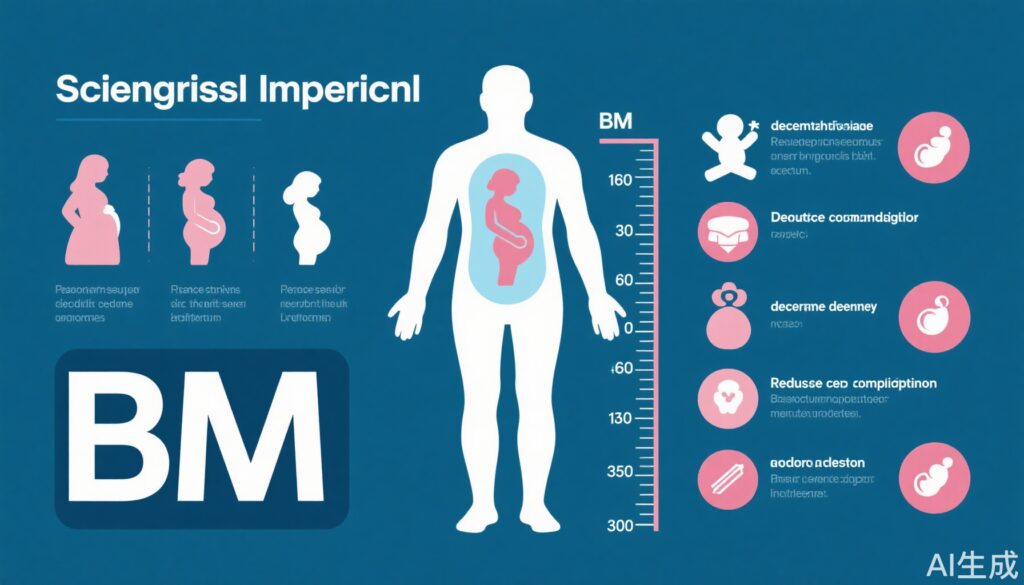Highlights
- Preconception weight loss of 10%-25% modestly increases pregnancy rates (~5% over 3 years) among overweight and obese women.
- Weight loss prior to conception is associated with significant reductions in gestational diabetes, pregnancy-induced hypertension, and emergency cesarean delivery.
- Lifestyle interventions, including diet and exercise, and in select cases weight-loss medications, are important tools to improve reproductive outcomes; however, timing and cessation before conception should be carefully managed.
- Bariatric surgery shows promise in improving spontaneous ovulation and fertility in obesity-related anovulatory infertility, such as polycystic ovary syndrome.
Background
Obesity and overweight constitute a substantial reproductive health challenge worldwide. Elevated body mass index (BMI) is linked with decreased natural fertility, higher risk of pregnancy complications including gestational diabetes mellitus (GDM), hypertensive disorders, cesarean delivery, and adverse neonatal outcomes such as large-for-gestational-age infants. Improving maternal health before conception through weight management may ameliorate these risks and enhance fertility. However, high-quality population-level evidence quantifying such benefits and guiding clinical management remains an area of active investigation.
Key Content
Population-Based Evidence on Weight Loss and Pregnancy Outcomes
A landmark cohort study by Verfürden et al. analyzed data from nearly 250,000 women aged 18 to 40 years in the UK with BMI ≥25 kg/m2, obtained from linked primary care and hospital records (Human Reproduction, 2025). Women achieving a median weight loss of 14% prior to conception experienced approximately a 5% increased chance of pregnancy over the ensuing 3 years compared with weight-stable counterparts. Those who lost weight had statistically significant reductions in gestational diabetes incidence, pregnancy-induced hypertension, and emergency cesarean sections. Additionally, fewer large-for-gestational-age infants were born to women with preconception weight loss, indicating improved fetal growth regulation.
Systematic Reviews and Meta-Analyses of Preconception Weight Loss Interventions
A 2024 meta-analysis combining 16 RCTs and cohort studies (Fertil Steril, 2024) demonstrated that preconception weight loss interventions—utilizing lifestyle modifications and/or pharmacotherapy—increased pregnancy rates (RR 1.24) but did not show clear benefits on live birth or miscarriage rates. Women with BMI ≥35 kg/m2 and those undergoing interventions ≤12 weeks appeared to derive the greatest pregnancy enhancement. However, the heterogeneity of trials and patient populations limits uniform applicability, underscoring the need for individualized approaches.
Role of Lifestyle Interventions and Weight Loss Medication
Lifestyle modification (nutrition, physical activity) remains first-line for preconception weight management, with evidence showing even modest weight loss (~5%) reduces cardiometabolic risk factors such as glucose intolerance, hypertension, and systemic inflammation. In clinical practice, weight-loss pharmacotherapies (e.g., GLP-1 receptor agonists like semaglutide) may be considered for patients refractory to lifestyle changes, with recommendations to discontinue before conception due to teratogenic safety concerns. Preconception counseling should emphasize a 6-month window for healthy weight optimization.
Bariatric Surgery in Obesity-Related Infertility
Randomized controlled trials in women with polycystic ovary syndrome (PCOS) and severe obesity have demonstrated that bariatric surgery significantly increases ovulation rates compared to medical therapy (Lancet 2024). Surgery facilitated 2.5-fold higher spontaneous ovulation and improved fertility prospects over one year, albeit with an increased adverse event rate. These findings highlight bariatric surgery as a viable treatment option in select infertile obese patients refractory to lifestyle and pharmacologic therapy.
Weight and Other Obstetric Outcomes
Obesity influences labor dynamics and healthcare resource utilization, with severely obese women showing stronger uterine contractility yet reduced attainment of active labor and vaginal delivery (BJOG 2022). Higher BMI correlates with prolonged labor, increased intervention rates, longer hospital stays, and higher postpartum healthcare use (Obstet Gynecol 2022). Additionally, surgical site wound complications after cesarean delivery are reduced by absorbable suture skin closure compared with staples regardless of obesity status (Obstet Gynecol 2022).
Expert Commentary
Clinicians including Dr. Deidre Neyhart-McIntosh underscore the clinical relevance of preconception weight loss to improve fertility and reduce adverse pregnancy outcomes. The biological plausibility stems from improved insulin sensitivity, hormonal milieu normalization, reduced inflammation, and cardiovascular risk mitigation achieved by weight loss. Despite potential conflicts of interest in industry-funded studies, the consistency across population-level data and clinical experience supports these recommendations.
Cautious interpretation is warranted given observational design limitations and potential residual confounding. Importantly, weight loss strategies must be personalized, considering patient readiness, comorbidities, and reproductive goals. Future research should focus on optimal interventions, timing, and long-term maternal-child health outcomes, integrating mechanistic biomarkers to clarify causal pathways.
Conclusion
Preconception weight loss between 10% to 25% is associated with moderately increased natural conception rates and decreased risks of gestational diabetes, hypertensive disorders, and cesarean delivery in overweight and obese women. Lifestyle interventions remain foundational, while pharmacotherapy and bariatric surgery are options in select cases. Incorporating preconception weight management into routine obstetric care can improve pregnancy success and safety, addressing a critical public health gap. Ongoing research will refine evidence-based guidelines and personalized approaches for optimizing reproductive outcomes in this population.
References
- Verfürden ML, Schnecke V, Winning Lehmann E, et al. Association between weight loss and reproductive outcomes among women with overweight or obesity: a cohort study using UK real-world data. Hum Reprod. 2025 Jul 6:deaf122. doi:10.1093/humrep/deaf122 . PMID: 40618200 . PDF download
- Mutsaerts MAQ, et al. Effectiveness of preconception weight loss interventions on fertility in women: a systematic review and meta-analysis. Fertil Steril. 2024 Aug;122(2):326-340. doi:10.1016/j.fertnstert.2024.02.038 . PMID: 38408693 .
- Hammer FD, et al. Bariatric surgery for spontaneous ovulation in women living with polycystic ovary syndrome: the BAMBINI multicentre randomized controlled trial. Lancet. 2024 Jun 8;403(10443):2489-2503. doi:10.1016/S0140-6736(24)00538-5 . PMID: 38782004 .
- McIntosh DN. Clinical perspectives on obesity and pregnancy. Cleveland Clinic. Commentary 2025.
- Other articles as referenced (PMID: 35195337 ; 35852281; 35576345).



